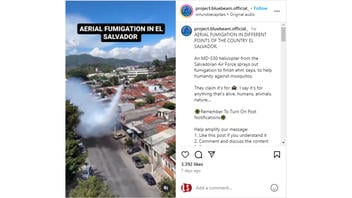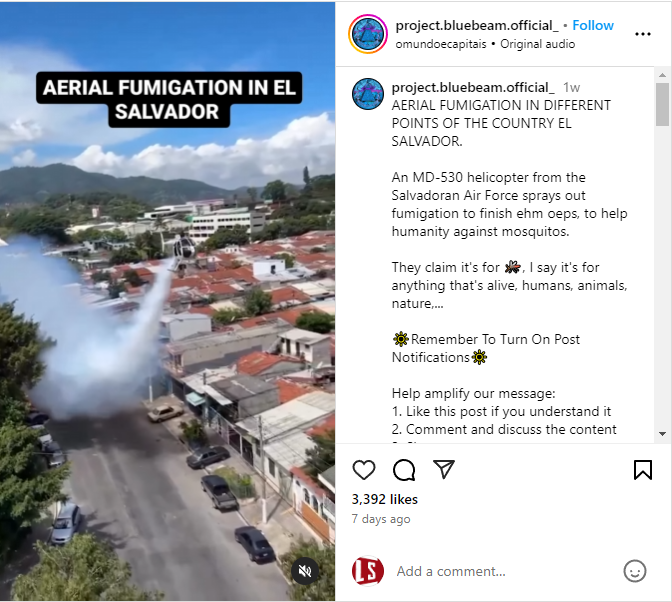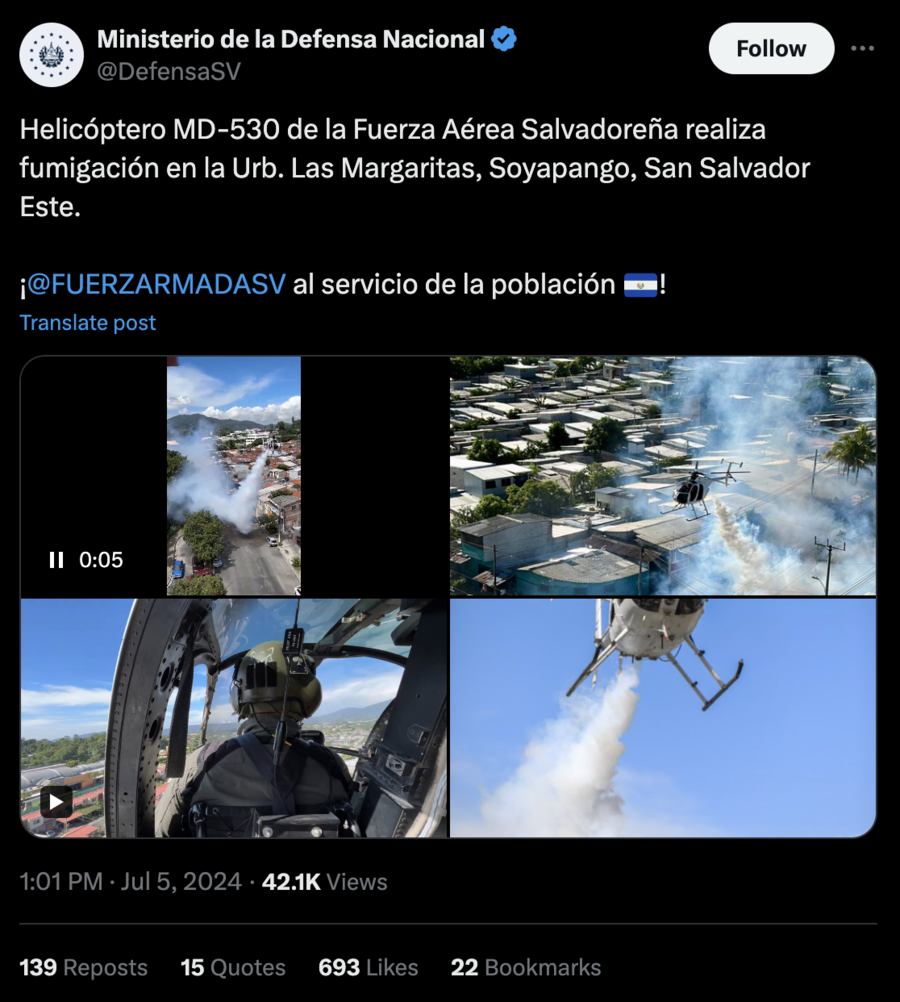
Does a video on Instagram show helicopters in El Salvador spraying communities with something harmful to humans in the guise of treating for mosquitoes? No, that's not true: El Salvador's National Defense Ministry said the clip shows the Salvadoran Air Force carrying out fumigation for mosquito control. The Centers for Disease Control and Prevention says aerial spraying does "not pose a risk to human health or the environment when applied correctly."
The claim originated in a video on Instagram on August 1, 2024, with a caption that read in part:
AERIAL FUMIGATION IN DIFFERENT POINTS OF THE COUNTRY EL SALVADOR.
An MD-530 helicopter from the Salvadoran Air Force sprays out fumigation to finish ehm oeps, to help humanity against mosquitos.
They claim it's for 🦟, I say it's for anything that's alive, humans, animals, nature,...
Here is how the post appeared at the time of writing:
(Source: Instagram screenshot taken Thu Aug 8 06:27:00 2024 UTC)
The video in the post shows the Salvadoran Air Force carrying out fumigation for mosquito control. The spraying came after health officials issued a health alert over increased dengue cases in July 2024.
A Google keyword search (archived here) revealed that the video in question was first shared to X on July 5, 2024, (archived here) by the Ministerio de la Defensa Nacional, or National Defense Ministry (archived here). A caption with the post read:
Helicóptero MD-530 de la Fuerza Aérea Salvadoreña realiza fumigación en la Urb. Las Margaritas, Soyapango, San Salvador Este.
¡@FUERZARMADASV al servicio de la población 🇸🇻!
Translated by Lead Stories staff, the above caption reads in part: "MD-530 helicopter of the Salvadoran Air Force carries out fumigation in the Urb. Las Margaritas, Soyapango, San Salvador Este."
Here is how that post appeared at the time of writing:
(Source: X screenshot taken Thu Aug 8 16:36:48 2024 UTC)
Protección Civil de El Salvador (archived here) -- the General Directorate of Civil Protection, Prevention and Mitigation of Disasters -- posted similar photos to the group's official Facebook account on July 7, 2024 (archived here), with a caption that read:
Equipos de fumigación aérea siguen trabajando para la eliminación del dengue. ❌🦟
📍Montes de San Bartolo.
Translated by Lead Stories staff, the above caption reads: "Aerial fumigation teams continue working to eliminate dengue. ❌🦟📍San Bartolo Mountains."
Officials posted the videos above following an uptick in dengue infections. On July 5, 2024, the U.S. Embassy in El Salvador issued a health alert (archived here) about dengue concerns, as well as fumigation efforts carried out by local officials:
The Ministry of Health (MINSAL by its acronym in Spanish) and Salvadoran Civil Protection have declared a countrywide Red Alert due to an early and steep rise in dengue cases in El Salvador. Since late June, El Salvador has reported 139 confirmed cases, 4 of them at a critical level. So far, all cases have involved youth under 19 years of age, and 60% of the cases have involved children under the age of nine.
MINSAL and Civil Protection are executing a national fumigation plan focused in the 30 districts with the highest rate of confirmed cases. These districts are concentrated in the metropolitan area of San Salvador and the interior of the country.
El Salvador Minister of Health Dr. Francisco Alabi (archived here) also addressed the epidemiological alert in a video (archived here) shared on the Gobierno de El Salvador (Government of El Salvador) website on July 2, 2024. The alert was declared in part due to infant deaths caused by dengue infection, according to the website.
The World Health Organization describes dengue (archived here) as a viral infection transmitted to humans through the bite of infected mosquitos. Most people with dengue have mild or no symptoms and will clear the infection in a week or two. However, some cases may become more severe and result in symptoms like high fever, muscle and joint pains, and bleeding gums or nose, among others. There is no specific treatment for dengue.
Aerial spraying is used to control and reduce mosquito populations that may spread dengue fever and other mosquito-borne illnesses, according to the Centers for Disease Control and Prevention (archived here). Airplanes and helicopters like those seen in the video on Instagram treat areas with larvicides or adulticides to kill mosquito larvae or adults. The CDC adds that aerial spraying does "not pose a risk to human health or the environment when applied correctly."



















